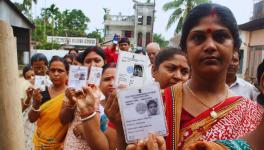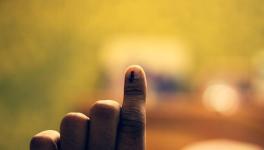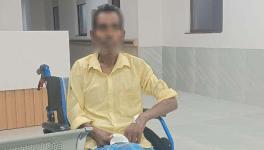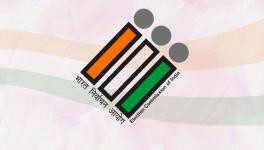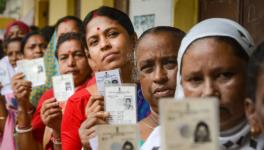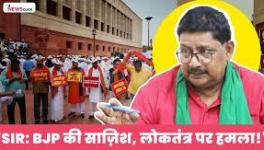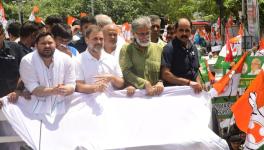In India, Online Voting Will Further Weaken Democracy
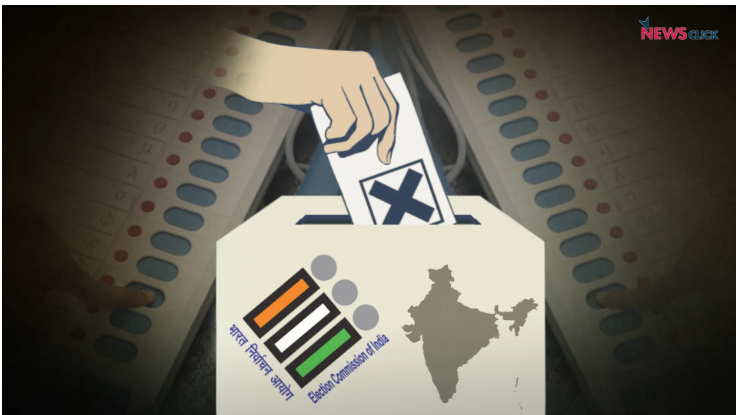
Bihar deputy chief minister and senior Bharatiya Janata Party (BJP) leader Sushil Modi's recent prod to the Election Commission of India (ECI) to shift to online voting, at least for the Bihar Assembly elections where polling must be completed and the new House has to be constitutionally constituted before November 29, is a scheming way of tampering with the electoral system and excluding those living on the margins of society.
In the times of severe hardships faced by people due to COVID-19 pandemic, democracy should be made more inclusive to ensure that the voice of those who are bearing the brunt of virus' wrath, finds articulation in elections. The proposal, if accepted by the ECI, would further weaken democracy in India and provide the BJP and its ally in the state, Janata Dal United, an added advantage.
Modi is quoted as saying that "it is certain that the elections cannot be held in the conventional manner owing to Covid-19 pandemic." While this is true regarding the nature of campaigning, as large public meetings will be history at least for the moment, Modi appeared to be mixing up campaigning, voting and interacting with party cadre.
The BJP leader said: "Interaction with the electorate will be done mostly through digital medium. Today, every house in Bihar has a television set and all villages in the state get 18-20 hours of electricity. For instance, we are interacting with our party workers in two hour-long audio and video sessions every day. Thus, the next election will be digital election involving digital electioneering."
Sushil Modi is obviously plugging for online voting because it will benefit his party because of a more efficient party structure (which works in conjunction with the Rashtriya Swayamsevak Sangh network). He even tweeted news about his statement.
इस बार संभव है वोटरों को बूथ पर न जाना पड़े... pic.twitter.com/GKp8KwYDZT
— Sushil Kumar Modi (@SushilModi) May 20, 2020
While there have been a couple of so-called interactions with party members and cadre -- by Prime Minister Narendra Modi on April 6 to mark the BJP's 40th Foundation Day, and by RSS Sarsanghchalalak, Mohan Bhagwat, on April 26, who addressed a so-called 'online Bauddhik' -- these have been chiefly campaign exercises.
Video conferencing within government has also become a norm and even in the 2019 Lok Sabha elections, there was a significant increase in electronic modes of campaigning. Narendra Modi has used hologram technology to beam images of him delivering a speech from a studio located in a remote place. But even this will not be possible, as there will be a big assembly of people. Emphasis will be thus on delivering messages through TV and mobile handsets.
But, this does not mean that Indians are ready for Public Network Direct-Recording Electronic Voting System, where votes can be cast by individual voters in privacy either over internet or through telephony. India may be boasting of being the largest user of mobile phones and mobile internet data but the majority of people continue using their devices for pure telephony or at best for entertainment purposes or sharing jokes or videos.
Premature introduction of voting on a public network would either exclude a large number of voters or make them dependent on others to cast their votes. Most Indians' ability to use the mobile handsets is limited to phone calls, messages and watching videos. The problems faced by migrants trying to register online to return home is a pointer to this technology deficiency of people. There is the added problem that not every Indian, especially women and those on the margins of society, either do not own a phone or use the basic keypad mobiles that are not connected to Internet.
But, if people have to depend on others to vote through their devices, there could be many instances when the political choice of the technology-deficient individual is different from the enabler's. This could either result in discord within family or in the community. Because the power balance in this strata of society is tilted in favour of people who are relatively tech-savvy, the verdict may not correctly reflect the electoral sentiment.
Rushing into online voting is akin to a person escorting the voter to the EVM (electronic voting machine) to assist in pressing the 'right' button and would be a throwback to the days of paper ballots when quite often the village headman's goons would cast votes for all.
Sushil Modi asserted that "several countries have held elections through online medium. Thus, if EC develops such a system here as well, then voters may not be required to go to the polling booths and exercise their franchise sitting at home." This statement suffers from insufficient information and perpetuates the misconception that South Korea conducted its recent National Assembly elections in April using online technology.
While Public Network Direct-Recording Electronic Voting System has been used in some countries at local or provincial levels, Estonia is the only nation which provides voters with the option from voting from home for national polls. But this is because of its compact size – a population of just about 13.3 lakh - and also because of technological advancement.
As regards the National Assembly polls in South Korea on April 15, special arrangements were made to maintain social distancing and avoiding touch with voters wearing disposable gloves. Additionally, voters were directed to wear face masks, have their temperature checked, disinfect their hands and stand one metre apart from other voters. Almost 50,000 people who were self-isolating were also allowed to vote, but after normal polling ended in the evening, and provided they displayed no symptoms of COVID-19.
Almost 26% of the electorate had cast their votes earlier, either by post or in special quarantine booths to ensure everyone desirous to vote could exercise their right. South Korea incidentally uses a paper ballot. South Korea has a total electorate of about 44 million while Bihar has an electoral college of approximately 72 million. Voter turnout in Korea was marked at a high 66.2%, the highest since 1992.
After the voting in South Korea, the ECI had stated that it was studying measures used in that country. Election Commissioner Ashok Lavasa had said that if the crisis continued "some modifications of the existing procedures might be required."
The arrangements made in South Korea are completely doable for even the entire country. At the most, more staff may be required and polling will require to be held over more phases. The key decision, however, will have to be taken about the use of indelible ink. While Lavasa said decisions would be taken after consulting health experts and stakeholders, a possible way out can be the use of disposable swabs or miniature wipes.
There is the additional issue that the ECI will have to consider. A large number of migrants who have returned to their villages may not be registered voters in Bihar because they may have become semi-permanent residents of states where they worked. The ECI will have to take up the task of updating the electoral list on an urgent basis, the moment lockdown is either lifted or restrictions on movement removed.
At every step, the ECI has to ensure that Indian democracy becomes more representative, not less. Any suggestion to the contrary must be rejected with the swiftness it deserves.
The writer is a freelance journalist based in Delhi. The views are personal.
Get the latest reports & analysis with people's perspective on Protests, movements & deep analytical videos, discussions of the current affairs in your Telegram app. Subscribe to NewsClick's Telegram channel & get Real-Time updates on stories, as they get published on our website.











